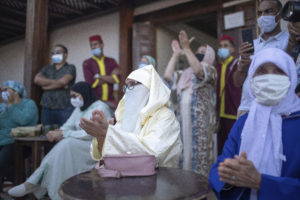
People attend a political rally for Aziz Akhannouch, Moroccan businessman and head of the RNI party, in Rabat, Morocco, Thursday, Sept. 2, 2021, days before the upcoming legislative and regional elections. Millions of Moroccans head to the polls on Sept. 8 to cast ballots in pivotal legislative and regional elections amid strict safety guidelines as the north African country is grappling with a new wave of COVID-19, driven mainly by the Delta variant. (AP Photo/Mosa’ab Elshamy)
RABAT, Morocco (AP) — Moroccans voted Wednesday for a new parliament and local leaders in elections that have been reshaped by the pandemic, and whose outcome is hard to predict as opinion polls were not allowed.
Candidates promised to create jobs and boost Morocco’s economy, education and health care. The kingdom has been hit hard by the pandemic, but has Africa’s highest vaccination rate so far.
Despite a dip in popularity in recent years, the governing Islamist party is eyeing a third term at the helm of the government if it again wins the most parliament seats. But a recent election reform could limits its powers, and the role of lawmakers is limited by the powers of King Mohamed VI, who oversees strategic decision-making.
“I hope that the people we voted for do not disappoint us,” said voter Adel Khanoussi, casting his ballot in the capital Rabat. “There are so many projects that should be implemented. The people’s expectations are high.”
Turnout was 36% three hours before polls closed.
The outcome of Wednesday’s voting is difficult to predict since opinion polls on elections are banned. The race will likely be close and no matter which party comes first, it will likely need to cobble together a coalition with other parties to form the government.
At a school turned polling station in Temara, near the capital, dozens of people stopped in to vote before going to work. Two security officers were stationed outside, and a poll worker took voters’ temperatures before letting them in.
Once inside, voters are asked to provide their identity cards and hand over their phones before entering the booth. They’re required to use hand sanitizer, wear a mask and keep 1-meter (3-foot) distances.
A 36-year-old woman who only gave her name as Fatima said she hopes the parliament can bring a “new Morocco” seen as an advanced world country.
While Morocco has one of the region’s strongest economies and a thriving business district in Casablanca, poverty and unemployment are also widespread, especially in rural regions. Morocco has seen thousands of despairing youth make risky, often deadly, trips in small boats to Spain’s Canary Islands or to the Spanish mainland via the Strait of Gibraltar.
Strict pandemic guidelines restricted candidates’ ability to reach the 18 million eligible voters. Candidates weren’t allowed to distribute leaflets and had to limit campaign gatherings to a maximum of 25 people. As a result, many stepped up efforts on social media instead.
Morocco has registered more than 13,000 COVID-19-related deaths since the start of the pandemic, according to figures from the Moroccan Health Ministry.
There were 31 parties and coalitions competing for the 395 seats in the lower house of parliament. Voters will also be selecting representatives for 678 seats in regional councils.
The moderate Islamist Justice and Development Party (PJD), at the helm of the government since 2011, is seeking a third term. With Prime Minister Saad-Eddine El Othmani, the party has campaigned on raising the competitiveness of Morocco’s economy.
El Othmani acknowledged that turnout is a “challenge” in a country where many are disillusioned with politics, but said he was encouraged at his voting station to see “good participation of voters of both sexes.”
Other major contenders are the center-left Party of Authenticity and Modernity, or PAM, the Istiqlal party and the liberal National Rally of Independents.
Istiqlal general secretary Nizar Baraka said the new parliament should “work for the people to get them out of poverty and stop the deterioration of the middle class.”
The elections were monitored by 4,600 local observers and 100 more from abroad.
